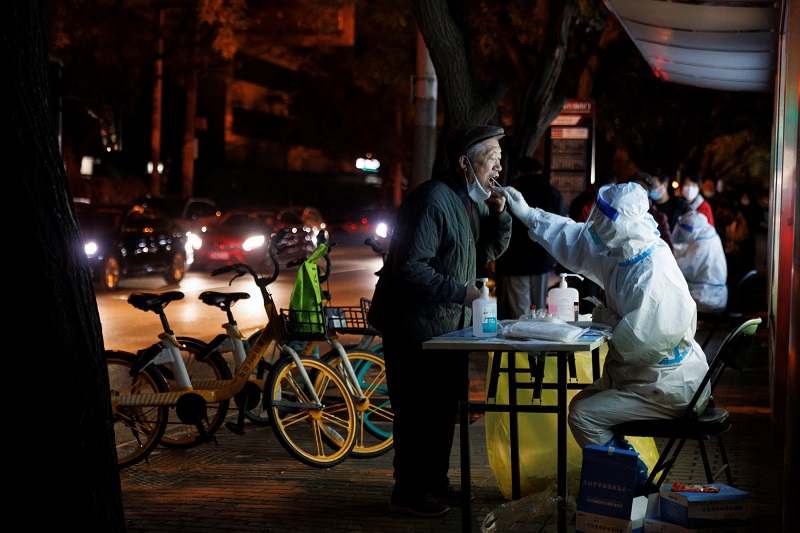
A man gets a swab tests at a temporary testing station as outbreaks of the coronavirus disease continue in Beijing on Monday.
12:04 JST, November 15, 2022
BEIJING (Reuters) — China’s factory output grew more slowly and retail sales fell in October, the latest sign that the world’s second-largest economy is losing momentum as it struggles with protracted COVID-19 curbs and a property downturn.
Property investment also fell at a faster pace in the January-October period, pointing to further weakness in a key pillar of China’s economy.
Industrial output rose 5.0% in October from a year earlier, missing expectations for a 5.2% gain in a Reuters poll and slowing from the 6.3% growth seen in September, official data showed on Tuesday.
Retail sales fell 0.5%, the first fall since May when Shanghai was under a city-wide lockdown. Analysts had expected retail sales to rise 1.0%, slowing from a 2.5% gain in September.
It was the latest data to point to a slowdown in China’s economy, with recent figures also showing exports falling, inflation slowing and new bank lending tumbling.
China’s economy is facing a series of headwinds including its zero-COVID policy, a property slump and global recession risks. Recent moves to ease some COVID curbs and provide financial support to the property market have underpinned market sentiment, but analysts expect Beijing’s strict COVID policy to continue to weigh on economic activity.
Chinese consumers have borne the brunt of stringent COVID curbs, as fresh virus lockdowns and restrictions impeded travels and hurt shoppers’ confidence while the government has focused on ramping up infrastructure investment.
Fixed asset investment expanded 5.8% in the first 10 month of the year, versus expectations for a 5.9% rise and growth of 5.9% in January-September.
Property investment fell 8.8% year-on-year in January-October, after declining 8% in January-September.
China’s property sector, which accounts for a quarter of the economy, has slowed sharply this year as the government sought to restrict excessive borrowing by developers. A plan to shore up liquidity outlined by Chinese regulators on Sunday sent Chinese property stocks and bonds soaring on Monday.
Hiring remained low among companies growing increasingly wary about their finances. The nationwide survey-based jobless rate stayed at 5.5% in October, unchanged from September. Youth unemployment stood at 17.9%, also the same level as September.
The country is on track to miss its annual growth target of around 5.5%, analysts say. Economists in a Reuters poll expect the economy to grow 3.2% in 2022 growth.
Top Articles in News Services
-

Survey Shows False Election Info Perceived as True
-

Hong Kong Ex-Publisher Jimmy Lai’s Sentence Raises International Outcry as China Defends It
-

Japan’s Nikkei Stock Average Touches 58,000 as Yen, Jgbs Rally on Election Fallout (UPDATE 1)
-

Japan’s Nikkei Stock Average Falls as US-Iran Tensions Unsettle Investors (UPDATE 1)
-

Trump Names Former Federal Reserve Governor Warsh as the Next Fed Chair, Replacing Powell
JN ACCESS RANKING
-

Producer Behind Pop Group XG Arrested for Cocaine Possession
-

Japan PM Takaichi’s Cabinet Resigns en Masse
-

Japan Institute to Use Domestic Commercial Optical Lattice Clock to Set Japan Standard Time
-

Man Infected with Measles Reportedly Dined at Restaurant in Tokyo Station
-

Israeli Ambassador to Japan Speaks about Japan’s Role in the Reconstruction of Gaza




















